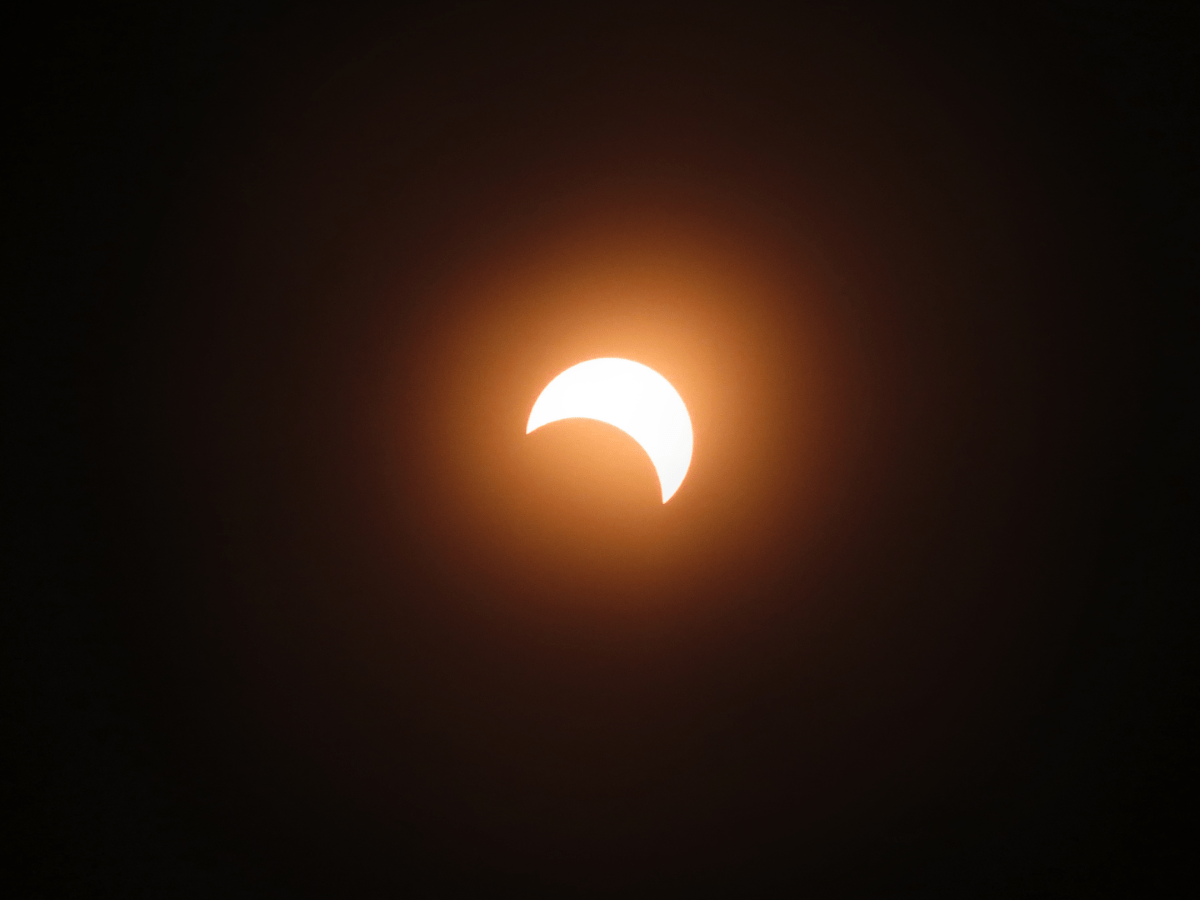Something very special is happening on Monday, April 8: a total solar eclipse will cross North America from Mexico to Canada! After April 8, the next solar eclipse viewable from the contiguous United States won't occur until August 23, 2044!
Although the total eclipse on April 8 will be visible only along a relatively narrow path (stretching from Texas to Maine) a partial eclipse will be visible throughout much of the United States.
How to Enjoy the Eclipse in Philadelphia
Here in Philadelphia, we’ll experience a "deep partial" eclipse, with a little over 90% of the Sun obscured by the Moon’s shadow, as it passes between Earth and the Sun.
While it won’t be quite as dramatic for those of us here as it will be for those in the line of totality — where the light of the sun will be entirely blocked, appearing as a dark circle with a fuzzy circle of light surrounding it (known as a corona) — it will still be an exciting opportunity to witness a rare celestial phenomenon. Our eclipse will begin at 2:08 p.m. and last for over two hours, with the time of greatest coverage occurring at 3:23 p.m.
To watch the eclipse, it will be important to protect your eyes, as looking at the sun directly can easily burn your retina. Fortunately, you can pick up free solar eclipse glasses at library locations throughout the city, although supplies are limited and each location will have its own distribution rules.
Many libraries will hold special events and activities leading up to the day of the eclipse, during which limited numbers of eclipse glasses will be available. Multiple libraries will host watch parties, either on-site at the library itself or in a nearby open space, like Shakespeare Park, Rittenhouse Square, Marconi Plaza, or Woodlands Cemetery. The viewing party at the Falls of Schuylkill Library will even have a LightSound device on hand, which enables the Blind and Low Vision community to experience the eclipse via sound.
View Eclipse Events at Your Library
Eclipse Reading List
And, of course, the Free Library has plenty of books for all ages to help you prepare to celebrate the eclipse, a selection of which includes:
Eclipse (2017) by Andy Rash
After hearing about the total solar eclipse happening in two months, a boy makes a plan with his father to go see it. They drive to the perfect campsite, not wanting to miss the couple of minutes when the sun will be completely hidden by the moon. When the moment happens, being together makes it even more special. Based on a trip that author-illustrator Andy Rash took with his son to see the eclipse in August 2017, Eclipse is a heartfelt and playfully illustrated ode to seeking out unique adventures and savoring the most special moments with the people you love. The book features maps of eclipses' paths and scientific back matter about eclipses.
What Is A Solar Eclipse? (2024) by Dana Meachen Rau
Just in time for the third North American total solar eclipse of the 21st century, this book explains how to safely observe solar eclipses, how long eclipses last, and why they result in a blackout period during the day.
A Few Beautiful Minutes: Experiencing A Solar Eclipse (2023) by Kate Allen Fox; illustrated by Khoa Le
What happens during a solar eclipse? The sun vanishes. Light becomes dark. Day animals sleep, and night animals wake. The moon takes over the sky. People stop what they’re doing and together, they look up. The whole world changes for a few beautiful minutes.
In the Shadow of the Moon: The Science, Magic, and Mystery of Solar Eclipses (2017) by Anthony F. Aveni
This book is an exploration of the scientific and cultural significance of this mesmerizing cosmic display.
Sun, Moon, Earth: The History of Solar Eclipses, From Omens of Doom to Einstein and the Exoplanets (2016) by Tyler E. Nordgren
An astronomer illustrates how the most seemingly unnatural of natural phenomena was transformed from a fearsome omen to a tourist attraction. From the astrologers of ancient China and Babylon to the high priests of the Maya, we go around the world to see how different cultures interpreted these dramatic events.
Eclipse Chaser: Science in the Moon's Shadow (2019) by Ilima Loomis
The August 2017 solar eclipse is the chance of a lifetime for astronomer Shadia Habbal — years of planning come down to one moment of totality. Will everything go as planned?
Looking Up! The Science of Stargazing (2017) by Joe Rao
Did you know that comets are sometimes called "hairy stars?" Or that if you saw a sunset on the moon, the sun would look white because the moon doesn't have an atmosphere? You'll learn this and much more as you become an expert on the objects in the sky.
Mask of the Sun: The Science, History, and Forgotten Lore of Eclipses (2017) by John Dvorak
They have been thought of as harbingers of evil as well as a sign of the divine. Eclipses — one of the rarest and most stunning celestial events we can witness here on Earth — have shaped the course of human history and thought since humans first turned their eyes to the sky.
Happy solar eclipse day! Fingers crossed for good weather!
Have a question for Free Library staff? Please submit it to our Ask a Librarian page and receive a response within two business days.









